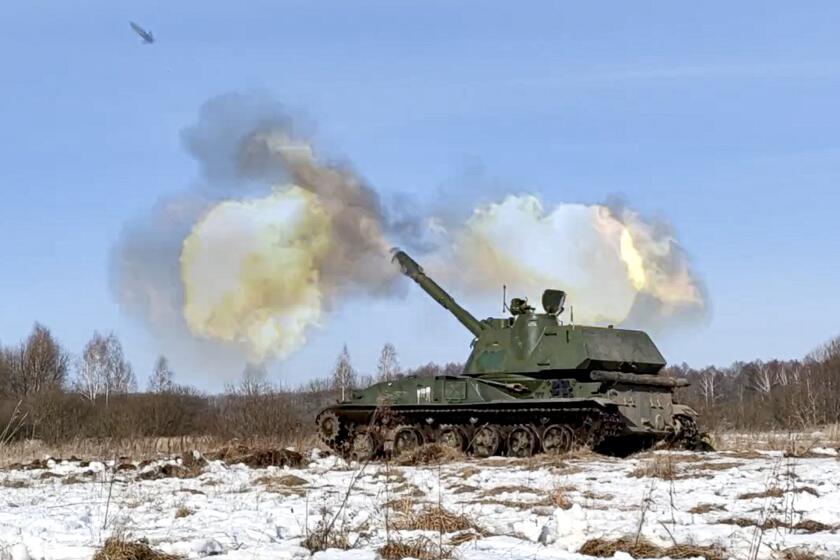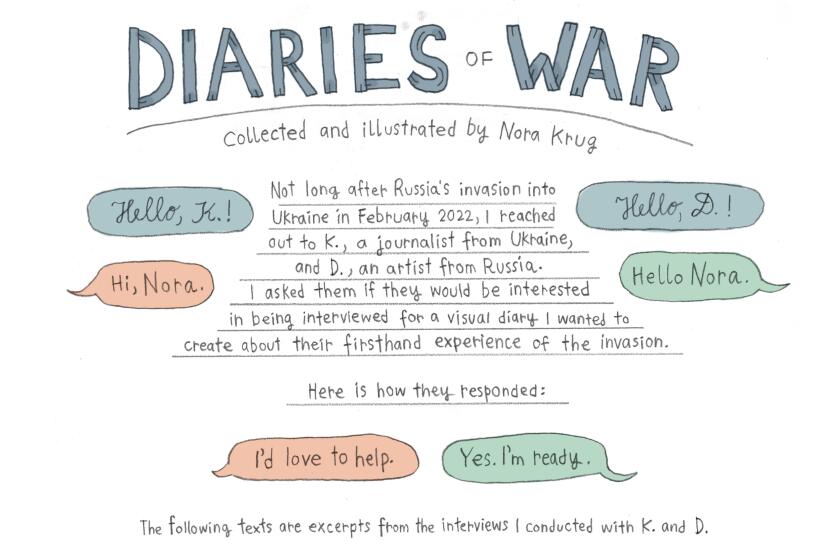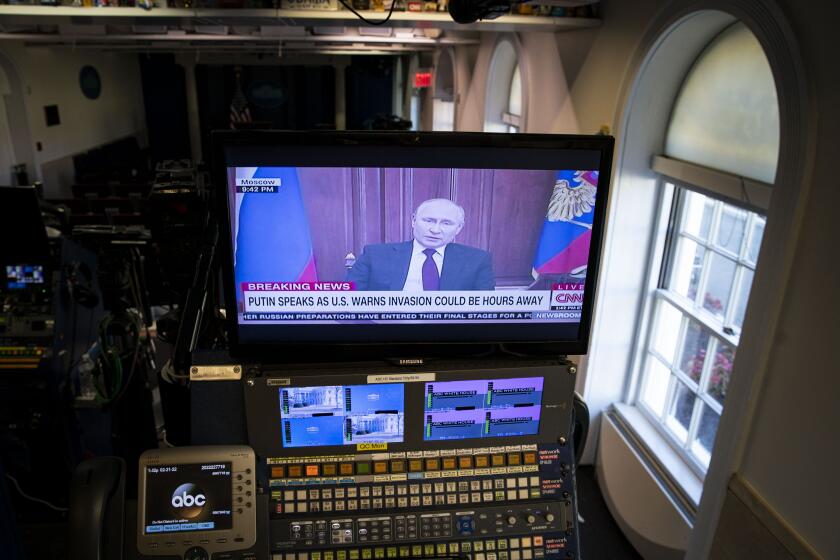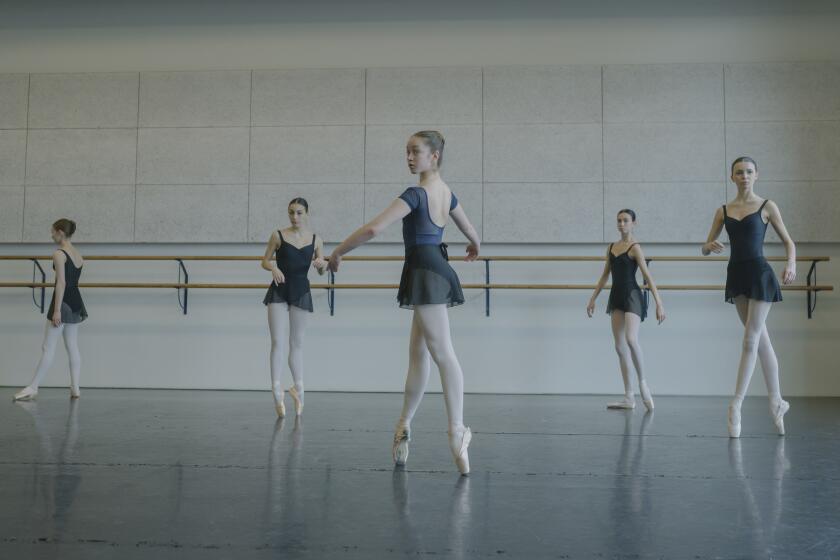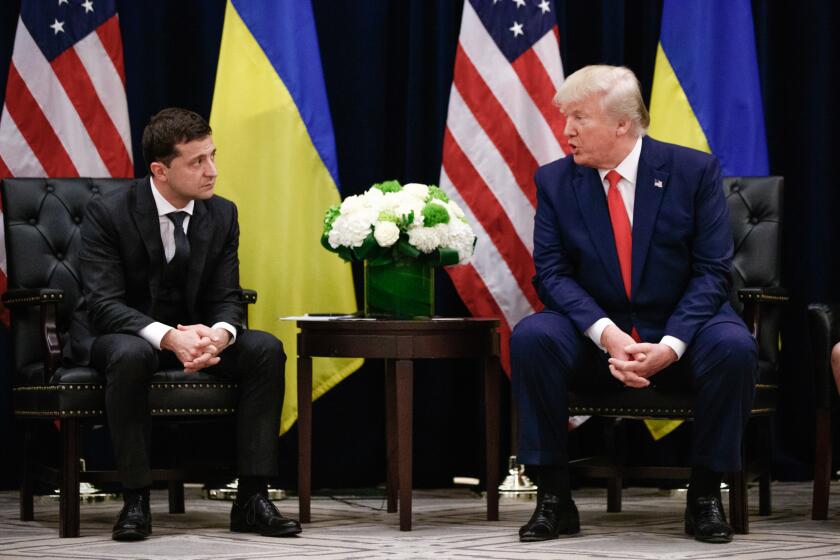U.S. formally accuses Russia of war crimes as humanitarian crisis in Ukraine deepens

Attacks on civilian targets, including apartment buildings, schools, a maternity ward and a theater said to be sheltering children are cited.
- Share via
LVIV, Ukraine — As President Biden headed Wednesday to a Europe with large-scale battles raging at its edge, his government formally declared that Russian forces have committed war crimes in their brutal attacks on civilians and others in Ukraine.
The besieged port of Mariupol was cited as one of the main pieces of evidence. On Wednesday, Ukraine said Russian forces hijacked aid missions headed to the devastated city, where one of the worst humanitarian crises of the escalating conflict has unfolded with hundreds of civilians killed and scarce supplies of food, water and medicine.
“Russian President Vladimir Putin has unleashed unrelenting violence that has caused death and destruction across Ukraine,” Secretary of State Antony J. Blinken said in announcing the U.S. government’s determination in a statement released as he flew to NATO headquarters in Brussels with Biden.
Blinken noted deadly Russian attacks on apartment buildings, hospitals, schools and shopping malls and, in Mariupol, on a maternity ward and theater said to be sheltering children. He cited United Nations statistics of nearly 5,000 civilians killed in the nearly monthlong war, almost half of those in Mariupol alone. The actual figures are believed to be much higher.
“Putin’s forces used these same tactics in Grozny, Chechnya, and Aleppo, Syria, where they intensified their bombardment of cities to break the will of the people,” Blinken said. “Their attempt to do so in Ukraine has again shocked the world.”
Both Biden and Blinken said recently they personally considered Putin to be a war criminal, but a formal declaration was pending while U.S. investigators documented the cases of potential crimes against humanity.
Hypersonic missiles fly so fast — many times the speed of sound — that they are almost impossible to detect by most air-defense systems.
The U.S. assessment helps build a legal case against Putin that would be prosecuted at a world judicial institution, such as the International Criminal Court at The Hague — even though the United States has not recognized the court. Perpetrators of atrocities in Rwanda and the former Yugoslavia in the 1990s have been prosecuted in similar systems, often in ad hoc courts established for specific episodes.
And some countries have invoked the concept of universal law to prosecute war criminals in their domestic courts even if the suspect and victims are of different nationalities — most recently in Germany, where a Syrian intelligence officer was convicted in January of crimes against humanity in the torture of Syrians at a Damascus detention center.
“I think it’s incredibly important to shed a light on what’s happening within Ukraine so that the people of Ukraine understand that the world knows what they are suffering, and that ... they’re suffering at the hands of an aggressive war that was launched unprovoked by Russia,” said Beth Van Schaack, the Biden administration’s new ambassador at large for global criminal justice.
She also said the action would help preserve evidence “with an eye towards future accountability.”
It will do little to stop the violence, however. In Mariupol on Wednesday, where entire streets of buildings have been reduced to rubble from ceaseless shelling, Ukrainian officials said 15 aid workers and drivers were seized as they made their way to the strategic southeastern port next to the Crimean peninsula. The city remains under Ukraine’s control but was said to have been breached by an unknown number of Russian troops Tuesday.
The Red Cross said that one of its convoys was unable to enter the city, but confirmation of the Ukrainian allegation of abductions was unavailable.
The accusation came as the North Atlantic Treaty Organization said it would beef up forces along its eastern flank to deter Russia from launching an attack on any of the alliance’s member nations. NATO Secretary General Jens Stoltenberg said Wednesday that new multinational battle groups, which normally consist of about 1,000 to 1,500 troops, would be established in Hungary, Slovakia, Romania and Bulgaria and would remain stationed there “as long as necessary.”
The war in Ukraine has resulted in “a new normal for our security, and NATO has to respond to that new reality,” Stoltenberg said on the eve of an emergency meeting of NATO leaders in Brussels, which Biden is scheduled to attend.
The NATO chief also called on the allies to step up defense of other potentially threatened countries such as Georgia, which Russia invaded in 2008, and Bosnia-Herzegovina, where numerous disgruntled Serbs favor Moscow.
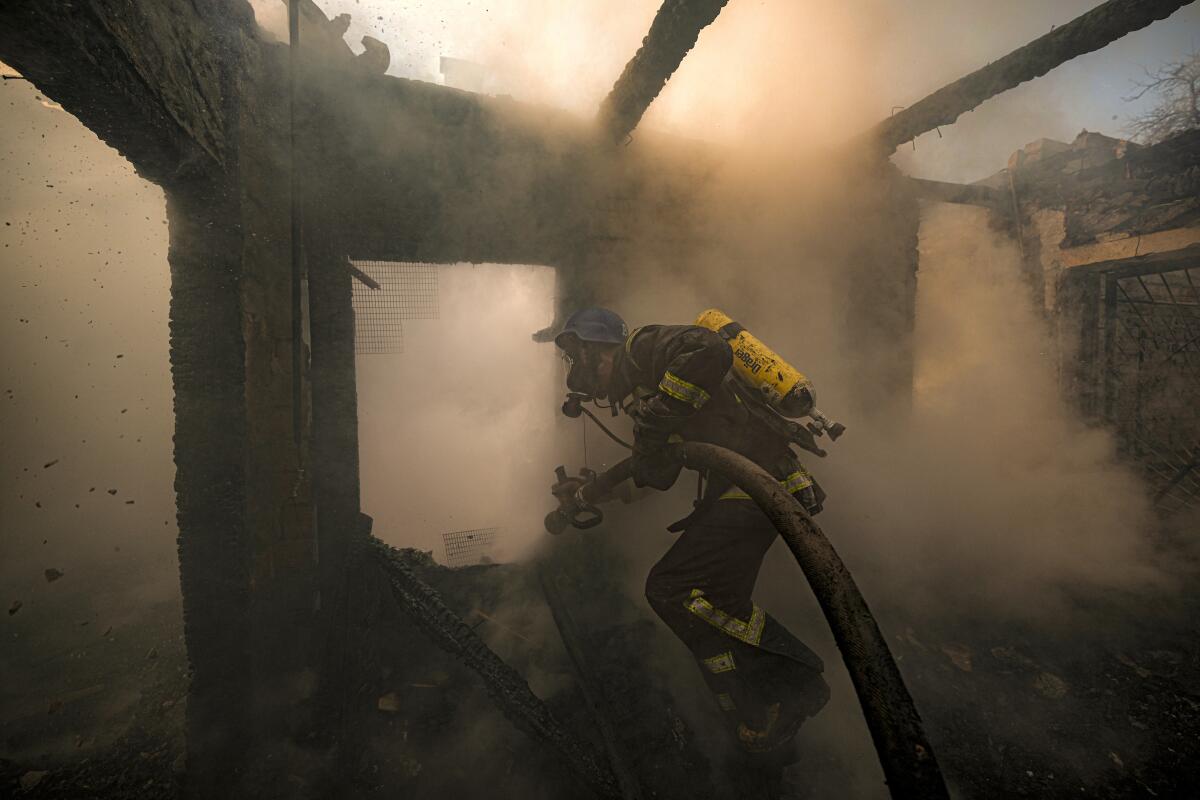
Biden will use the emergency NATO meetings in Brussels, as well as those of the European Union and the Group of 7 leading industrialized nations, to push for more sanctions against Russia and ways to bolster military defense of Ukraine without escalating the conflict.
Also on Wednesday, NATO officials released an estimate that put the number of Russian military deaths in the Ukraine war between 7,000 and 15,000. It is difficult to make an accurate count, however, but U.S. Defense officials say Russia’s losses are much higher than its military commanders anticipated.
U.S. diplomats have been intensely scrutinizing events in Moscow for indications that any of Putin’s domestic support might be flagging. They cited as one indication the reported resignation — or dismissal — Wednesday of senior Kremlin official Anatoly Chubais, who is believed to have left the country. He is often described as a reform-minded technocrat who might have disagreed with Putin’s decision to launch a war on Ukraine.
Meanwhile, Kremlin officials handed the U.S. Embassy a list of several American diplomats who are being declared persona non grata and will be expelled, the latest in tit-for-tat efforts by both capitals to reduce the other nation’s diplomatic presence. The U.S. State Department said Moscow’s action was “unhelpful and unproductive.”
The devastation in Mariupol has made it one of the worst human catastrophes of the war.
“We are trying to organize stable humanitarian corridors for Mariupol residents, but almost all of our attempts, unfortunately, are foiled by the Russian occupiers, by shelling or deliberate terror,” Ukrainian President Volodymyr Zelensky said in an overnight video address.
Diaries of war: a weekly series telling the stories of K., a journalist in Ukraine, and D., an artist in Russia, as they deal with Putin’s invasion of Ukraine and the trauma and threats to their lives.
“Employees of the state emergency service and bus drivers have been taken captive,” Zelensky said. He described the city, where an estimated 100,000 people — about a quarter of its prewar population — remain trapped, as one suffering “inhumane conditions. In a total blockade. Without food, water, medication. Under constant shelling, under constant bombing.”
As the death toll in Mariupol climbed, the lack of electricity slowed rescue workers’ efforts to locate survivors beneath leveled buildings and much of the city. Zelensky said more than 7,000 people had been evacuated over the last day. Deputy Prime Minister Iryna Vereshchuk said Wednesday that no agreement was reached with Russia to evacuate civilians from the center of Mariupol despite humanitarian corridors being open elsewhere in the nation.
Still, residents have slowly made their way out, traveling between small towns over many days as they seek safety. Hundreds of former Mariupol residents arrived early Wednesday in Lviv, the western city that has become a hub for those seeking to flee to neighboring nations such as Poland, Romania and Moldova.
Attacks and street fighting continued elsewhere Wednesday, with a report from the Kyiv city administration that overnight shelling had hit a high-rise apartment building and homes in the Sviatoshynskyi and Shevchenkivskyi districts, west of the city center. Information on deaths or injuries was unknown.
Moscow’s war machine includes a popular TV talk show whose host, Dmitry Kiselyov, takes on anyone who contradicts Russian President Vladimir Putin.
Deadly missile attacks on neighborhoods and suburbs in the capital have become a near-daily part of life as Russian forces remain arrayed on the outskirts, apparently unable to penetrate Kyiv.
Mayor Vitali Klitschko said the Ukrainian military had taken back areas northeast and northwest of the city, including heavily bombarded Irpin. He said civilian deaths in the city had reached 264 since the invasion began.
Zelensky, who has asked unsuccessfully for negotiations with Russian President Vladimir Putin and spent the last week making daily appeals to foreign lawmakers, addressed the Japanese parliament Wednesday.
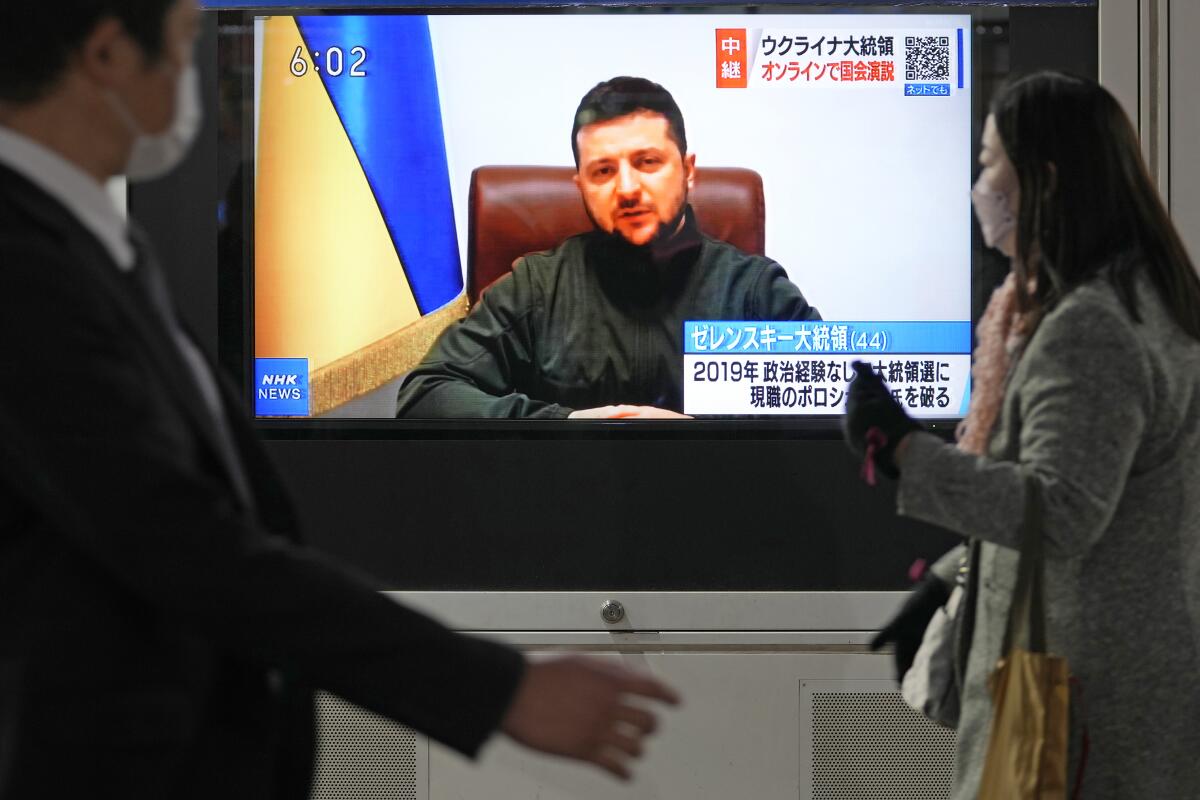
“I hope you will continue imposing sanctions. Let’s try to find a way which enables Russia to find a peaceful solution,” he said.
The president has demanded that NATO create a no-fly zone over Ukraine. But he has repeatedly been told by leaders of NATO member states, including the U.S., that that will not happen, for fear of turning the conflict into a world war.
On Wednesday, Ukrainian presidential advisor Mykhailo Podolyak suggested alternative forms of assistance: modern air-defense systems, cruise missiles or shells, an embargo on Russian oil and the closure of ports around the world to Russian ships.
The Russian invasion put a stop to the student ballet scholarship competition Youth America Grand Prix’s event in Kyiv. The organization has since helped more than 80 young Ukrainian dancers escape the conflict by placing them in schools across Europe.
The U.S. and European nations have offered billions in military aid and imposed several rounds of economic sanctions on Russia. Germany, which is heavily dependent on Russian gas, said Wednesday that it would consider cutting off Russian imports but not immediately.
“Yes, we will end this dependency — as soon as possible,” German Chancellor Olaf Scholz said during a budget speech to Parliament. “But to do this from one day to the next would mean plunging our country and the whole of Europe into a recession.”
Poland said it was expelling 45 Russian diplomats who the government said were Russian spies. The Russian ambassador to Warsaw, who is not among those being ejected, denied the allegation.
Biden will also travel to Poland on Friday to show his support for a nation that has received more than half of the 3.5 million refugees who have fled Ukraine. The United Nations says the war has displaced 10 million Ukrainians, many of whom have left eastern Ukraine for safer areas in western parts of the country, since the Russian invasion began Feb. 24.
Start your day right
Sign up for Essential California for the L.A. Times biggest news, features and recommendations in your inbox six days a week.
You may occasionally receive promotional content from the Los Angeles Times.
Ukrainian and Russian officials have regularly met for negotiations over the course of the war but have been unable to agree on terms for a cease-fire.
U.S. and British intelligence reports have said Russia’s invasion has not gone according to plan and described Russian troops as struggling to hold on to gains in key regions. A senior U.S. Defense official said this week that there were “indications that [Ukraine is] now able and willing to take back territory that the Russians have taken.”
According to an analysis from the Washington-based Institute for the Study of War, Russian attacks are stalled around several major cities. Russia “did not make any major advances” overnight, the institute said, emphasizing that there were no major strikes on the northeastern cities of Chernihiv, Sumy or Kharkiv.
“Russian forces around Kyiv and other major cities are increasingly prioritizing long-range bombardment after the failure of Russian ground offensives,” the analysis said. That includes the use of hypersonic missiles, which fly up to 15 times the speed of sound and can easily evade air defense systems.
The former president attempted to extort Zelensky for political favors and made Ukraine a pawn. Putin took note.
In an interview with CNN on Tuesday, Kremlin spokesman Dmitry Peskov insisted that the invasion was going “strictly in accordance with the plans and the purposes that were established beforehand.”
Peskov also refused to rule out the use of nuclear weapons. When asked about the possibility, he said that the Kremlin would consider a nuclear attack if there was an “existential threat for our country.”
In response, Pentagon spokesman John Kirby said the remarks did not reflect the “way a responsible nuclear power should act.” He added that the U.S. has not “seen anything that would lead us to conclude that we need to change our strategic deterrent posture.”
At the United Nations on Wednesday, delegates debated competing resolutions on the humanitarian crisis in Ukraine. A version favored by the U.S. and several allies placed blame for the disaster on Russia, while a separate resolution sponsored by South Africa did not.
McDonnell reported from Lviv, Kaleem from London and Wilkinson from Washington.
More to Read
Sign up for Essential California
The most important California stories and recommendations in your inbox every morning.
You may occasionally receive promotional content from the Los Angeles Times.
